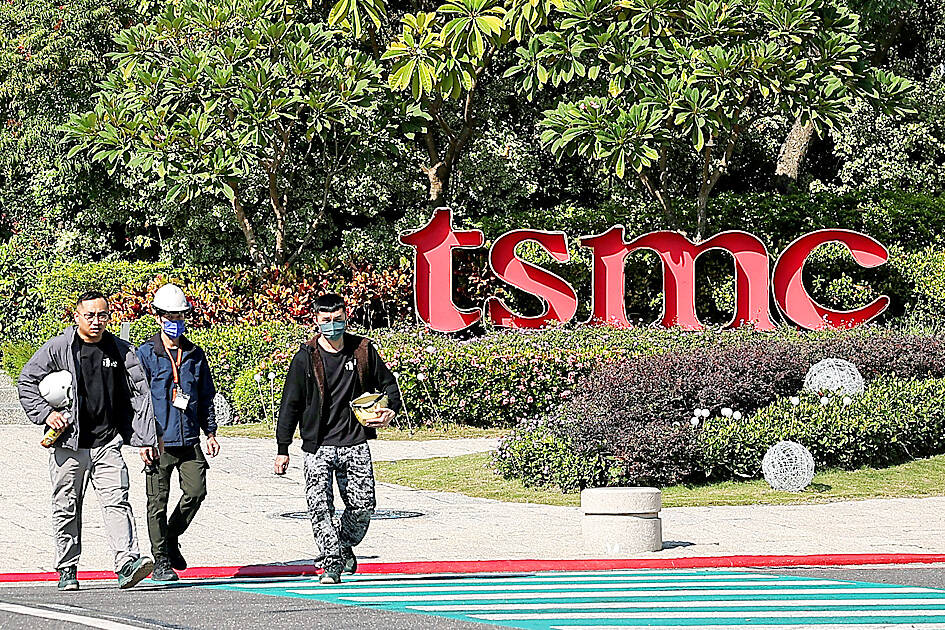Taiwan Semiconductor Manufacturing Co (TSMC, 台積電) applied for the most patents of any company in Taiwan for the ninth consecutive year last year, data released on Saturday by the Intellectual Property Office showed.
The office said in a statement that TSMC filed 1,412 invention patent applications last year, down 28 percent from a year earlier, but still the most among all the patent applicants in Taiwan.
The office said the drop in TSMC’s filings largely reflected the contract chipmaker’s patent development strategies.

Photo: Ann Wang, Reuters
Under Taiwanese law, patents are categorized into three groups — invention, utility model and design — with invention patents considered the most important for new technologies.
DRAM chip supplier Nanya Technology Corp (南亞科技) filed the second-most patents at 466 invention patents, up 25 percent from a year earlier.
Rounding out the top 10 Taiwanese invention patent applicants were flat-panel maker AUO Corp (友達) with 425 applications, down 5 percent; the Industrial Technology Research Institute (工研院) with 356, up 15 percent; flat screen producer Innolux Corp (群創) with 328, up 1 percent; artificial intelligence server maker Inventec Corp (英業達) with 321, up 6 percent; communication network IC designer Realtek Semiconductor Corp (瑞昱) with 309, up 14 percent; PC brand Acer Inc (宏碁) with 277, down 5 percent; iPhone assembler Hon Hai Precision Industry Co (鴻海) with 259, up 93 percent; and smartphone IC designer MediaTek Inc (聯發科) with 239, down 56 percent.
Hon Hai had the highest increase in invention patent applications in Taiwan last year, the Intellectual Property Office said.
Among foreign companies in Taiwan, American semiconductor equipment supplier Applied Materials Inc had the most invention patent applications last year after filing 950 applications, up 29 percent from a year earlier.
That helped Applied Materials replace South Korea’s Samsung Electronics Co, which filed 894 invention patents, down 8 percent from a year earlier, to become the top foreign applicant, the office said.
South Korean e-commerce operator Coupang Corp was third after filing 698 invention patents, up 54 percent from a year earlier ahead of Japanese semiconductor and display production equipment supplier Tokyo Electron Ltd, with 661, up 21 percent, and American smartphone IC designer Qualcomm Inc, with 660, up 3 percent, the data showed.
Rounding out the top 10 foreign applicants were Japanese electrical product maker Nitto Denko Corp, with 417, down 13 percent; Dutch semiconductor equipment supplier ASML Holding NV, with 344, up 11 percent; Japanese semiconductor silicon provider Shin-Etsu Chemical Co, with 279, up 22 percent; US wafer-fabrication equipment supplier Lam Research Corp, with 276, up 12 percent; and Japanese semiconductor equipment supplier Screen Holdings Co, with 253, down 2 percent.

In Italy’s storied gold-making hubs, jewelers are reworking their designs to trim gold content as they race to blunt the effect of record prices and appeal to shoppers watching their budgets. Gold prices hit a record high on Thursday, surging near US$5,600 an ounce, more than double a year ago as geopolitical concerns and jitters over trade pushed investors toward the safe-haven asset. The rally is putting undue pressure on small artisans as they face mounting demands from customers, including international brands, to produce cheaper items, from signature pieces to wedding rings, according to interviews with four independent jewelers in Italy’s main

Japanese Prime Minister Sanae Takaichi has talked up the benefits of a weaker yen in a campaign speech, adopting a tone at odds with her finance ministry, which has refused to rule out any options to counter excessive foreign exchange volatility. Takaichi later softened her stance, saying she did not have a preference for the yen’s direction. “People say the weak yen is bad right now, but for export industries, it’s a major opportunity,” Takaichi said on Saturday at a rally for Liberal Democratic Party candidate Daishiro Yamagiwa in Kanagawa Prefecture ahead of a snap election on Sunday. “Whether it’s selling food or

CONCERNS: Tech companies investing in AI businesses that purchase their products have raised questions among investors that they are artificially propping up demand Nvidia Corp chief executive officer Jensen Huang (黃仁勳) on Saturday said that the company would be participating in OpenAI’s latest funding round, describing it as potentially “the largest investment we’ve ever made.” “We will invest a great deal of money,” Huang told reporters while visiting Taipei. “I believe in OpenAI. The work that they do is incredible. They’re one of the most consequential companies of our time.” Huang did not say exactly how much Nvidia might contribute, but described the investment as “huge.” “Let Sam announce how much he’s going to raise — it’s for him to decide,” Huang said, referring to OpenAI

The global server market is expected to grow 12.8 percent annually this year, with artificial intelligence (AI) servers projected to account for 16.5 percent, driven by continued investment in AI infrastructure by major cloud service providers (CSPs), market researcher TrendForce Corp (集邦科技) said yesterday. Global AI server shipments this year are expected to increase 28 percent year-on-year to more than 2.7 million units, driven by sustained demand from CSPs and government sovereign cloud projects, TrendForce analyst Frank Kung (龔明德) told the Taipei Times. Demand for GPU-based AI servers, including Nvidia Corp’s GB and Vera Rubin rack systems, is expected to remain high,